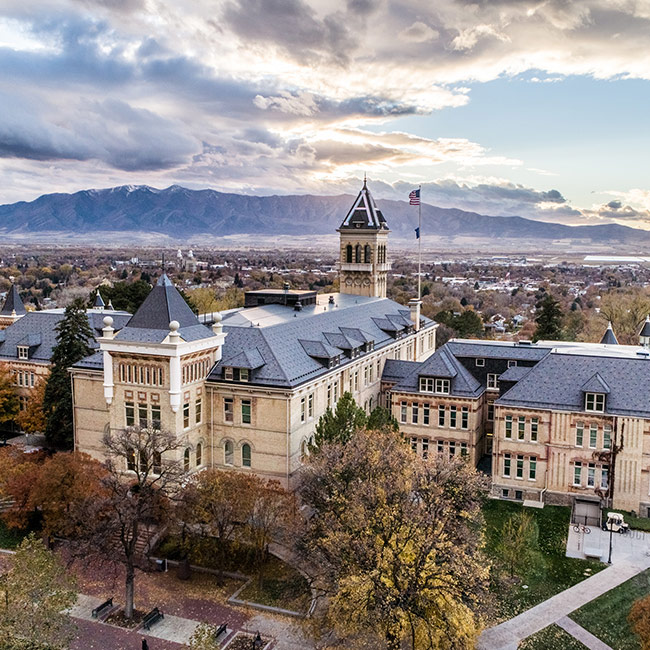About This Degree
Mechanical engineering deals with the creation of the mechanical systems and machines that serve society.
Mechanical engineers are involved in researching and designing mechanical devices of all types, including engines, tools, and machines. The broad discipline allows graduates to work in nearly every area of industry.
The Department of Mechanical and Aerospace Engineering at USU is second in the nation for research funding received for aerospace engineering. Students consistently take top spots in national engineering competitions, giving them hands-on engineering and research experience and recognition for their work as undergraduates. The department also partners with the Space Dynamics Lab (at the USU Research Foundation), an internationally recognized research institution that brings in more than $50 million per year in funding. Students also have opportunities to work at the Space Dynamics Laboratory.
What You Will Learn
The department offers a sound framework of engineering courses taught by a faculty with extensive academic and industrial experience. Coursework includes topics such as mechanics, design, dynamics, fluid mechanics, thermal science, and material science. Students’ culminating experience in the program is a year-long capstone where they work in groups to design and build a product. These projects are often commissioned by actual clients, so their designs and creations are actually used in various real-world capacities.
The mechanical engineering degree is accredited by the EAC Accreditation Commission of ABET. The job placement rate for students graduating from USU’s engineering programs is extremely high.
Concurrent Bachelor’s/Master’s Program:
The department also offers a concurrent bachelor’s/master’s program, which allows USU engineering students to begin taking graduate classes during their senior year as an undergraduate and to complete requirements for both the bachelor's degree and the master’s degree concurrently over two years.
Emphasis:
Aerospace Engineering:
Aerospace engineers design, develop, and test aircraft, spacecraft, and missile systems, as well as supervising the manufacturing process of these products. Students focusing on aerospace engineering have the qualifications to become an aeronautical engineer or an astronautic engineer. Aeronautical engineers are those aerospace engineers who deal with airplanes, while astronautic engineers are engineers who deal specifically with spacecraft.
ADVISING
At a Glance
College: College of Engineering
Department: Mechanical and Aerospace Engineering Department
USU Locations:
- Logan campus
Program Requirements
Career And Outcomes
Career Opportunities
With a degree in mechanical engineering, students can pursue careers in a variety of industries:
- Equipment maintenance
- Automotive design
- National defense
- Electrical utilities
- Electronics design
- Fluids engineering
- Food processing
- Physical planning
- Medical device
- Robotics design
- Solar energy structure
- Design engineer (Designs products or systems, such as instruments, controls, robots, engines, machines)
- Test engineer (Plans and directs engineering personnel in fabrication of test control apparatus and equipment)
- Plan engineer (Plans, directs, and coordinates the activities concerned with design, construction, modification and maintenance)
- Applications engineer (Develops and writes equipment specifications, performance requirements, cost analysis, and proposals for integrating machinery in the manufacturing process)
Aerospace Engineering Emphasis
- Aircraft design and development
- Aircraft flight testing
- Spacecraft and space systems design
- Spacecraft trajectory design and analysis
The Career and Design Center provides counseling and information on hundreds of job and internship opportunities and even helps students apply and interview.
Job Outlook
USU Locations

LOGAN CAMPUS
Admission
Admission Requirements
In addition to Utah State University’s admissions requirements, the mechanical engineering program has additional requirements:
- Freshmen: Students that meet the USU admission requirements and meet these minimum requirements can be admitted as a pre-professional mechanical engineering major.
- Minimum 3.5 High School GPA
- 24 ACT
- 25 Math ACT
- 81 Admission Index
- Transfer Students: Transfer students from other institutions or other programs at USU must meet these requirements to be admitted as a pre-professional mechanical engineering major.
- MATH 1210: Calculus I completed with a C- or higher
- 12 credits or more of Science, Engineering and Math completed with a 3.0 or higher GPA
- Including all completed required Math, Science, and Engineering courses have a 3.0 or higher GPA
- No grades less than C- in required courses
- No more than 2 repeats in pre-professional courses. The 2 repeat requirement includes courses that are audited or receive a Passing grade. Retaking a course multiple times counts as multiple repeats.
- Recommended high school courses: two or three years of algebra, one year of geometry, one-half year of trigonometry, four years of English, and courses in computer programming, chemistry, and physics are preferred.
International students have additional admissions requirements.
Program Requirements
Students majoring in mechanical engineering must complete a capstone design project during their senior year.
Passing the Fundamentals of Engineering examination, which is the first step in becoming a licensed professional engineer, is required for graduation.
Take The Next Step
Visit Campus
Schedule a campus tour and come see what it's all about.
Cost and Aid
Learn about tuition, scholarships, and other financial aid opportunities.
How to Apply
Start your degree path and apply now.
You May Also Be Interested In

Civil Engineering
Learn how to plan, design, construct, and maintain public works and structures like roads, bridges, while also examining the environmental impacts and natural disaster mitigation techniques to solve problems and improve lives.

Computer Engineering
Learn how to design, build, and program various forms of software and hardware, from small electronics and appliances to cars and airplanes, as you learn from experts in a top-tier department with high job placements and starting salaries.

Electrical Engineering
Learn to work with electronics, electricity, electromagnetism, and electronic devices of all types in this accredited program offering broad foundational knowledge to prepare you for a successful career as an electrical engineer.

Environmental Engineering
Take the opportunity to solve real-world problems through research that can benefit human lives and improve the environment, as well as gaining valuable hands-on experience in the field with professors and internships with experts.

